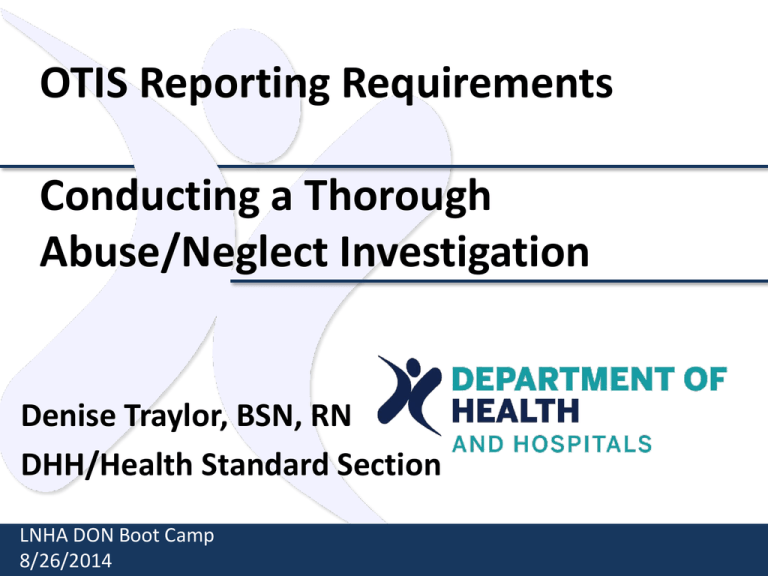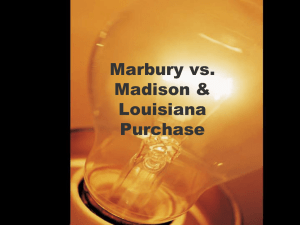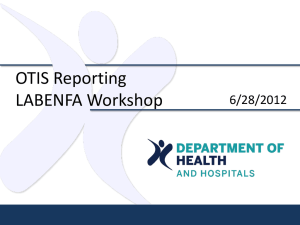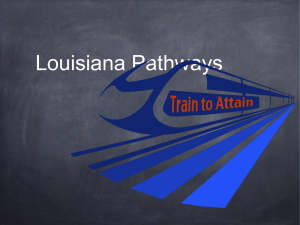DON Boot Camp Power Point Presentation (LNHA)
advertisement

OTIS Reporting Requirements Conducting a Thorough Abuse/Neglect Investigation Denise Traylor, BSN, RN DHH/Health Standard Section LNHA DON Boot Camp 8/26/2014 Conflict of Interest Statement • There is no conflict of interest present for planners and faculty/presenter/authors relative to this educational activity, including financial relationships LOUISIANA DEPARTMENT OF HEALTH AND HOSPITALS/Health Standards Section 2 Objectives • Discuss regulatory reporting timelines • Define & discuss Abuse, Neglect, Injury of Unknown Origin, Misappropriation of Property, Willful Infliction of Injury with Intent to Harm and their relationship to state & federally mandated reporting in the Online Tracking Incident System (OTIS) • Review & discuss federal regulations governing the reporting of Abuse, Neglect, Injury of Unknown Origin and Misappropriation of Property reporting LOUISIANA DEPARTMENT OF HEALTH AND HOSPITALS/Health Standards Section 3 Objectives • Discuss incidents that are and are not reportable in the OTIS system • Discuss appropriate referrals • Discuss the investigation of elopements • Discuss the components of a thorough investigation • Discuss clinical forensic markers to consider in Abuse/Neglect investigations • Discuss Health Standards processes in reviewing OTIS reports LOUISIANA DEPARTMENT OF HEALTH AND HOSPITALS/Health Standards Section 4 Reporting Requirements • F-225 – All alleged violations are reported immediately to administrator and to other officials in accordance with state law, (including the State survey & certification agency); – The facility must have evidence that all alleged violations are thoroughly investigated, and prevent further potential abuse while the investigation is in progress – the results of the investigation must be reported to the administrator and other officials in accordance with state law (including the State survey & certification agency) within 5 working days of the incident 5 Reporting Requirements • State Minimum Licensure – Immediate verbal reporting and a preliminary written report within 24 hours of the incident to Health Standard Section through OTIS – Appropriate authorities are to be notified according to state law LOUISIANA DEPARTMENT OF HEALTH AND HOSPITALS 6 Injury of Unknown Origin • F-225 – Injury of unknown source must meet both of these conditions • Source of the injury not observed by any person, or the source of the injury could not be explained by the Resident and • the injury is suspicious because of the extent of the injury or the location of the injury (injury located in an area not generally vulnerable to trauma) or the number of injuries observed at one particular point in time or the incident of injuries over time LOUISIANA DEPARTMENT OF HEALTH AND HOSPITALS/Health Standards Section 7 What in Injury of Unknown Origin Is Not • An Injury of Unknown Origin does not include minor bruises, abrasions, scrapes, etc., that are not suspicious for Abuse. • Injury that is explained by a cognitive Resident • Non-serious injury that is in an area that is not suspicious for Abuse. LOUISIANA DEPARTMENT OF HEALTH AND HOSPITALS/Health Standards Section 8 Policies & Procedures • F-226 – Policies and procedures for screening and training employees, protection of Residents and for the prevention, identification, investigation and reporting of abuse, neglect, mistreatment of Residents and misappropriation of Resident property – Purpose is to assure that the facility is doing all that is within its control to prevent occurrences LOUISIANA DEPARTMENT OF HEALTH AND HOSPITALS/Health Standards Section 9 Reporting Requirements • The Discovered date is the point at which any member of your staff becomes aware of an allegation of Abuse, Neglect, Misappropriation of Resident property or Injury of Unknown Origin • Every staff member should be intimately familiar with the Abuse policy and should know how to institute Abuse procedures and immediately protect the Resident LOUISIANA DEPARTMENT OF HEALTH AND HOSPITALS/Health Standards Section 10 Abuse • F-223 – Willful infliction of injury, unreasonable confinement, intimidation or punishment with resulting physical harm, pain or mental anguish – Includes deprivation of goods and services necessary to attain or maintain physical, mental or psychosocial wellbeing LOUISIANA DEPARTMENT OF HEALTH AND HOSPITALS/Health Standards Section 11 Physical Abuse is Not • Staff to Resident – “roughness” that leaves no injury • Resident to Resident – Non-serious injuries that are not of serious consequence to the individual, such as those that cause discomfort, redness to the skin, minor scratches, superficial lacerations/skin tears, abrasions, minor bruising; pushing or pulling that causes no injury – If there is no injury, there is no physical abuse, unless the incident has potential for serious actual harm (Resident has knife, gun, etc.) LOUISIANA DEPARTMENT OF HEALTH AND HOSPITALS/Health Standards Section 12 Verbal Abuse • Use of oral, written or gestured language that willfully includes disparaging and derogatory terms to Residents or their families, or within their hearing distance, regardless of their age, ability to comprehend, or disability • Includes threats of harm, saying things to frighten a Resident • In the OTIS system, this would be reported as Emotional Abuse LOUISIANA DEPARTMENT OF HEALTH AND HOSPITALS/Health Standards Section 13 Verbal Abuse Is NOT • “rudeness” • “inappropriate” conversations/comments (within reason) • minor cursing • insults • nuisance • offensive remarks LOUISIANA DEPARTMENT OF HEALTH AND HOSPITALS/Health Standards Section 14 Mental Abuse • Includes, but is not limited to, humiliation, harassment, threats of punishment or deprivation • In the OTIS system, this is reported as Emotional Abuse LOUISIANA DEPARTMENT OF HEALTH AND HOSPITALS/Health Standards Section 15 Sexual Abuse • Includes but is not limited to sexual harassment, sexual coercion or sexual assault • In the OTIS system, this is reported as Sexual Abuse LOUISIANA DEPARTMENT OF HEALTH AND HOSPITALS/Health Standards Section 16 Involuntary Seclusion • Involuntary seclusion is separation of a Resident from other Residents or from her/his room or confinement to her/his room with or without roommates, against the Resident’s will or the will of the Resident’s RP • In the OTIS system, this would be reported as Emotional Abuse LOUISIANA DEPARTMENT OF HEALTH AND HOSPITALS/Health Standards Section 17 Involuntary Seclusion is NOT • Emergency or short term monitored separation from other Residents, if used for a limited period of time as a therapeutic intervention to reduce agitation until professional staff can develop a plan or care to meet the Resident’s needs LOUISIANA DEPARTMENT OF HEALTH AND HOSPITALS/Health Standards Section 18 Caregiver Neglect • F-224 – Failure to provide goods and services necessary to avoid physical harm, mental anguish or mental illness LOUISIANA DEPARTMENT OF HEALTH AND HOSPITALS/Health Standards Section 19 Caregiver Neglect Is Not • Acts of inefficiency, unsatisfactory conduct, failure in good performance LOUISIANA DEPARTMENT OF HEALTH AND HOSPITALS/Health Standards Section 20 Misappropriation of Resident Property • F-224 – Deliberate misplacement, exploitation or wrongful, temporary or permanent use of a Resident’s belongings or money without the Resident’s consent – The law does not specify a dollar amount or value LOUISIANA DEPARTMENT OF HEALTH AND HOSPITALS/Health Standards Section 21 Willful Infliction of Injury with Intent to Harm • “determination of abuse requires that the incident under investigation must have been willful and/or deliberate. If the perpetrator of the incident is demented, willfulness cannot be established.” (Regional S&C letter, 1/20/2000) • “If the Resident decision-making skills are impaired, the Resident’s actions cannot be considered willful, and the Resident cannot be held accountable.” (Regional S&C letter, 1/20/2000) LOUISIANA DEPARTMENT OF HEALTH AND HOSPITALS/Health Standards Section 22 Is the Resident Capable of Willful Infliction of Injury with Intent to Harm? • BIMS • Cognitive skills for daily decision making • Diagnoses – – – – – Dementia Alzheimer’s disease Psychotic disorders Bipolar Traumatic brain injury • Input from nursing staff, CNAs, therapists, etc. LOUISIANA DEPARTMENT OF HEALTH AND HOSPITALS/Health Standards Section 23 Incidents between Cognitively Impaired Residents • Cognitively impaired Resident cannot be named as the Accused if determined they cannot be held accountable for their actions • Investigate as allegations of Caregiver Neglect; Accused unknown unknown, Relationship staff, Title administrative staff – Evaluate systems in place to protect Residents – Were systems actively in place to ensure safety – Were Residents being supervised according to care plans? – Are care plan approaches appropriate? LOUISIANA DEPARTMENT OF HEALTH AND HOSPITALS/Health Standards Section 24 Serious Injury • Bodily injury which involves substantial risk of death, protracted and obvious disfigurement, or protracted loss or impairment of the function of a body member or organ, or mental faculty. • More than a minor cut, bruise or superficial skin tear. • Reduces the Resident’s appearance, value, usefulness etc., and impairs the function or condition of the Resident. • Has some connotations of permanence. • May be physical, mental or psychological. LOUISIANA DEPARTMENT OF HEALTH AND HOSPITALS/Health Standards Section 25 Non-Serious Injury • Any injury determined not to be serious by the appropriate medical personnel who assessed the Resident. • Includes: discomfort, superficial lacerations, skin tears, abrasions, minor bruising, etc. • May involve insult, nuisance and offence. LOUISIANA DEPARTMENT OF HEALTH AND HOSPITALS/Health Standards Section 26 What is Not Reportable • Resident to Resident incidents without injuries • Non-serious Injuries – Small bruises, skin tears – Minor injuries not of serious consequence – Injuries that cause discomfort, redness to the skin, minor bruising, scratches, superficial lacerations, skin tears, abrasions – Insult, disrespect, nuisance, offence, minor cursing LOUISIANA DEPARTMENT OF HEALTH AND HOSPITALS/Health Standards Section 27 What is Not Reportable • Resident to staff or visitors • Injury of Unknown Origin – Explained by Resident – Cognitive Resident states not from Abuse/Neglect – Non-serious Injury – Not in an area suspicious for Abuse LOUISIANA DEPARTMENT OF HEALTH AND HOSPITALS/Health Standards Section 28 What is Not Reportable • Minor occurrences which are not of serious consequence to the individual – should be recorded by the facility according to their policies and procedures for incident recording, investigation and tracking. LOUISIANA DEPARTMENT OF HEALTH AND HOSPITALS 29 PLEASE NOTE! • Residents involved in multiple incidents triggers at survey – Ensure that approaches in the care plan are appropriate – Ensure that staff are educated and approaches are being followed – Consider if there is adequate staff to supervise and monitor Residents – Monitor through QA tracking program LOUISIANA DEPARTMENT OF HEALTH AND HOSPITALS 30 Is This Resident Capable of Willful Infliction of Injury with Intent to Harm? ↙ ↘ YES ↓ Injury?? ↙ No Injury or Non-Serious Injury NO ↓ Injury?? ↘ ↙ Serious Injury ↘ No Injury or Non-Serious Injury ↓ ↓ ↓ Do Not Report Investigate Abuse System Failure?? ↙ ↘ Yes No ↓ Investigate Caregiver Neglect LOUISIANA DEPARTMENT OF HEALTH AND HOSPITALS Serious Injury ↓ Investigate Caregiver Neglect ↓ Do Not Report 31 Referrals • Facility – Law enforcement (CMS S&C memo, 6/17/2011) – APS – NAT-7 – Nursing Board • Health Standards – Sheriff’s office, Ag’s office – APS – Nursing board and other licensing boards – CNA desk LOUISIANA DEPARTMENT OF HEALTH AND HOSPITALS/Health Standards Section 32 Elopements • Resident who is an elopement risk leaves the premises or a safe area without authorization &/or necessary supervision • Investigate as Caregiver Neglect; Accused unknown unknown, Relationship staff, Title administrative staff (unless 1-on-1) – Was there a system failure? – Did the Resident elope because of lack of supervision? – Was the Resident being supervised according to care plan? – Were care plan interventions appropriate? LOUISIANA DEPARTMENT OF HEALTH AND HOSPITALS/Health Standards Section 33 Thorough Investigation • Facilities can best support the detection and prevention of abuse and neglect by establishing and facilitating policies and procedures that reinforce the expectation of immediate reporting of suspected abuse and neglect. • Providers should have a process in place that makes it possible for Residents, staff, family members, and advocates to report abuse and neglect in a manner that will elicit immediate attention by the organization. LOUISIANA DEPARTMENT OF HEALTH AND HOSPITALS/Health Standards Section 34 Thorough Investigation • All allegations should be treated with the same degree of consideration and seriousness • Thoroughly collecting information and corroborating evidence immediately improves the likelihood of a valid conclusion • Residents and staff should understand the meaning of Abuse/Neglect and their role in Abuse/Neglect reporting • All should feel protected from retaliation LOUISIANA DEPARTMENT OF HEALTH AND HOSPITALS/Health Standards Section 35 Thorough Investigation • Drawing a reasonable inference or an assumption about what happened does not negate the requirement for a thorough investigation and reporting of the incident. • The investigator must approach the investigation with an open mind, without jumping to conclusions, or formulating an opinion prior to evaluating all the collected evidence. LOUISIANA DEPARTMENT OF HEALTH AND HOSPITALS/Health Standards Section 36 STEPS PROCEDURES Step 1: Protect the Resident •Supervisor immediately assesses Resident’s personal safety & potential of harm to other Residents •If caregiver is named, supervisor immediately removes the accused caregiver from the Resident care area (obtain Accused’s statement prior to allowing them to leave the facility) •Notify designated managers of the allegation •Contact RP & physician •Determine if law enforcement should be involved LOUISIANA DEPARTMENT OF HEALTH AND HOSPITALS 37 Step 2: Assess the Effect on the Resident *Nursing supervisor immediately completes an assessment & documents findings; *If there is a physical injury, document the size, location, color, pattern, number of injuries, etc.; Include if treatment or medical attention is required & provided *Lead investigator/nursing supervisor assesses for psychosocial changes & documents findings *Appropriate medical/psychosocial treatment & support to the Resident is provided *Evaluate to determine if this incident should be reported in OTIS LOUISIANA DEPARTMENT OF HEALTH AND HOSPITALS 38 Step 3: *Who, What, Where, When, Why & How Investigate the *Collect & protect evidence, including any ER, Allegation hospital, X-ray, etc. reports *Obtain written, dated, signed statement from the Accused/s *Obtain written, dated, signed statements from the Resident/s & the person/s reporting the incident *Obtain written, dated, signed statements from all witnesses or any other persons who may have knowledge or information about this incident; ensure that statements are as detailed & objective as possible LOUISIANA DEPARTMENT OF HEALTH AND HOSPITALS 39 Step 3: Investigate the Allegation (con’t) *Review all statements for use of vague terms (“rough” treatment, “treated me ugly”, etc.), & obtain clarification *Review all statements for conflicting information & obtain clarification *Document any knowledge of bias between alleged abuser/s, witnesses or Residents *Review Accused’s work assignment & determine if Accused was working at the time of the incident; obtain a copy of the Accused’s time card *Review & consider Accused’s personnel record for history or previous disciplinary actions, accusations, etc. *Document any Resident outcomes LOUISIANA DEPARTMENT OF HEALTH AND HOSPITALS 40 Step 4: Conclude the Investigation *Review all components of the investigation *Determine if the allegations are Substantiated, Unsubstantiated, or Unable to Verify *Document any training done as a result of this incident, or systems put in place to ensure that this incident does not re-occur *Examine facility policies & procedures to determine if any changes are warranted LOUISIANA DEPARTMENT OF HEALTH AND HOSPITALS 41 Step 4: Conclude the Investigation *Review all components of the investigation *Determine if the allegations are Substantiated, Unsubstantiated, or Unable to Verify *Document any training done as a result of this incident, or systems put in place to ensure that this incident does not re-occur *Examine facility policies & procedures to determine if any changes are warranted LOUISIANA DEPARTMENT OF HEALTH AND HOSPITALS 42 Clinical Forensic Markers • Accidental trauma is usually distal: knees, chin, fingers and toes • Suspicious injuries generally midline and proximal: face, neck, chest, breast, back, buttocks • Sexual trauma: face, neck, arm, chest, breast, back and buttocks LOUISIANA DEPARTMENT OF HEALTH AND HOSPITALS/Health Standards Section 43 Fractures • Fractures of the head, spine and trunk are more likely to be assault injuries than limb fractures, sprains or musculoskeletal injuries • Spiral fractures of large bones with no history of gross injury suspicious • Fractures with rotational component suspicious LOUISIANA DEPARTMENT OF HEALTH AND HOSPITALS/Health Standards Section 44 ADDITIONAL CONSIDERATIONS • Medications – Aspirin, Warfarin, Ibuprofen, Celebrex, Ketorolac, Heparin, Depakote, Valproic Acid, Prednisone, Plavix • Herbal Supplements – St. John’s Wort, Bilberry, Garlic, Ginger, Ginko Biloba, Vitamin E and Fish Oil LOUISIANA DEPARTMENT OF HEALTH AND HOSPITALS/Health Standards Section 45 HSS Processes • Initial review by PM – Referrals to Sheriff’s office, NOPD • Final Review – Return for corrections – Request documentation – Refer to Sheriff’s office, NOPD, AG – RN board, LPN board, CNA desk, other licensing boards (Pharmacy board, Medical board, etc.) LOUISIANA DEPARTMENT OF HEALTH AND HOSPITALS/Health Standards Section 46 EXTENSIONS • Requests for Extensions – Granted by Denise Traylor, Program Manager or Lizzie Armstrong, Secretary – By email, fax or telephone • • • • Denise.Traylor@LA.GOV Lizzie.Armstrong@LA.GOV 225-342-0453 (fax) 225-342-7715 (Denise), 225-342-5795 (Lizzie) LOUISIANA DEPARTMENT OF HEALTH AND HOSPITALS/Health Standards Section 47 OTIS Glitches • When logging into OTIS, you get the message that you must use Internet Explorer when accessing this system: • Click on Tools, Highlight Compatibility View Settings, click on “Display all websites in Compatibility View”. If you continue to get this message, copy the OTIS URL and paste under “Add this website”, and click “Add” located to the right of the blank. The OTIS website should now be in the big box underneath LOUISIANA DEPARTMENT OF HEALTH AND HOSPITALS 48 49 50 OTIS Glitches • Input times in the Events section with no “0” in front: 3:54 pm, not 03:54 pm • Input of the Accused Title often has to be done twice, initially as well as when making corrections LOUISIANA DEPARTMENT OF HEALTH AND HOSPITALS 51 Senarios LOUISIANA DEPARTMENT OF HEALTH AND HOSPITALS/Health Standards Section 52 RESOURCES • OTIS Welcome Page – http://new.dhh.louisiana.gov/index.cfm/page/280 • OTIS Training Resources – Located near the bottom of the OTIS Welcome Page • http://new.dhh.louisiana.gov/index.cfm/newsroom/det ail/1693?uuid=1303144003194 LOUISIANA DEPARTMENT OF HEALTH AND HOSPITALS/Health Standards Section 53 CONTACT INFORMATION • Denise Traylor – OTIS Program Manager – 225-342-7715 (phone) – 225-342-0453 (fax) – Denise.Traylor@LA.GOV • Lizzie Armstrong – OTIS Secretary – 225-342-5795 (phone) – 225-342-0453 (fax) – Lizzie.Armstrong@LA.GOV LOUISIANA DEPARTMENT OF HEALTH AND HOSPITALS/Health Standards Section 54







